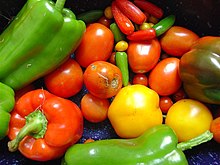phytochemicals such as polyphenols were not assessed in this review.[85]
Intestinal microbiome
The intestines contain a large population of gut flora. In humans, the four dominant phyla are Bacillota, Bacteroidota, Actinomycetota, and Pseudomonadota.[86] They are essential to digestion and are also affected by food that is consumed. Bacteria are essential for metabolizing food substrates and thereby increasing energy output, and produce a great variety of metabolites, including vitamins and short-chain fatty acids that contribute to the metabolism in a wide variety of ways.[87] These metabolites are responsible for stimulating cell growth, repressing the growth of harmful bacteria, priming the immune system to respond only to pathogens, helping to maintain a healthy gut barrier, control gene expression by epigenetic regulation[88] and defending against some infectious diseases.[89]
You received this message because you are subscribed to the Google Groups "2Top-manitotasy-Mirror1" group.
To unsubscribe from this group and stop receiving emails from it, send an email to 2top-manitotasy-mirror1+unsubscribe@googlegroups.com.
To view this discussion on the web visit https://groups.google.com/d/msgid/2top-manitotasy-mirror1/CACHR9V3y779eS-Kkbpeuhf5UK5TbbX8KAM0i36%3DT74461ffquw%40mail.gmail.com.

No comments:
Post a Comment